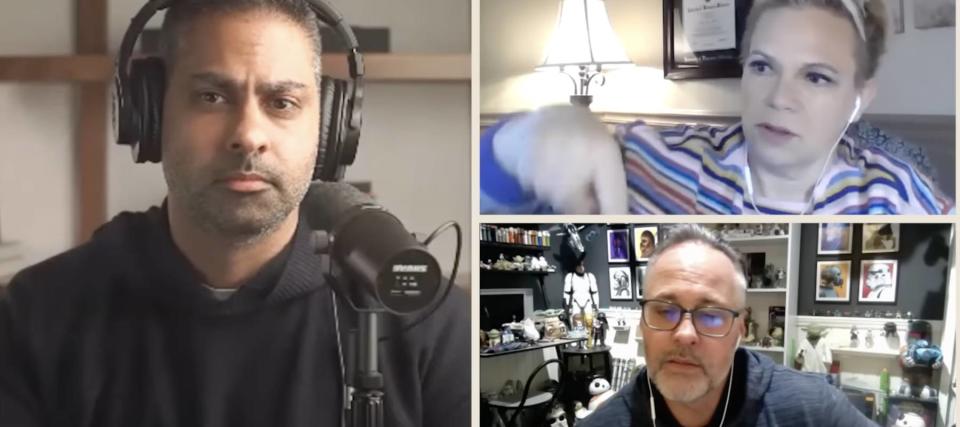This couple earns $246K/year but are still thousands of dollars in debt. Ramit Sethi weighs in

Higher incomes usually lead to better outcomes, especially if the goal is a comfortable retirement. However, a fat paycheck is by no means a guarantee for a safe and secure retirement.
That’s the realization Brad and Angie, empty-nesters from Wisconsin, have recently come to.
The couple appeared on an episode of Ramit Sethi’s podcast, I Will Teach You to Be Rich, where they described how they were struggling to make ends meet even though their combined annual income was roughly $246,000.
Don't miss
These 5 magic money moves will boost you up America's net worth ladder in 2024 — and you can complete each step within minutes. Here's how
Thanks to Jeff Bezos, you can now use $100 to cash in on prime real estate — without the headache of being a landlord. Here's how
'It's not taxed at all': Warren Buffett shares the 'best investment' you can make when battling rising costs — take advantage today
In fact, Brad’s credit card was recently declined when he was out to dinner with friends and he had to call his wife to bail him out. “I felt like a kid asking my parents for money,” he admitted.
Here’s how even high-income households can experience a squeeze on their wallets because of bad financial planning.
'Artificially subsidized'
As empty-nesters in their mid-50s, Brad and Angie are looking forward to retiring within a few years. Their dream is to buy an RV and travel across the country. Unfortunately, their savings and investments don’t allow for this.
Despite their relatively high income, the couple has assets worth $494,589, savings of just $2,975 — and a whopping debt of $433,105.
According to a July 2023 report from the Government Accountability Office (GAO), 90% of high-income seniors have some sort of retirement balance, but the median for these households was only $605,000. Given the current cost of living, that’s not enough to retire in most U.S. states.
Sethi believes part of the reason Brad and Angie are falling behind is because “only one person is rowing the canoe.” Brad has delegated all of the family’s financial planning to Angie because she has a business degree and is good with spreadsheets. “She’s the whiz kid,” he said. “I took the easier route and let her handle everything.”
As it turns out, 59% of women surveyed by HerMoney and the Alliance for Lifetime Income were primarily responsible for their family’s finances.
Of those surveyed, 48% were responsible for managing retirement plans for themselves and their partners.
However, by staying out of the loop, Brad is often caught off guard when an account is empty or a credit card balance is depleted. In a previous episode, Sethi described how a person can feel “artificially subsidized” when all the money-related responsibility falls on the partner.
Meanwhile, Angie’s spending habits are only further delaying the couple’s retirement targets.
Read more: Suze Orman says Americans are poorer than they think — but having a dream retirement is so much easier when you know these 3 simple money moves
Justifying spending
Angie’s humble background and upbringing have convinced her she “deserves” to spend her family’s high income. She admitted her budget for the family doesn’t leave much of a cash buffer for emergencies, which is why the couple often struggles with cash flow issues. She also admitted she’s guilty of overspending on the house and other indulgences.
“I definitely feel like I deserve [to spend] because now I make a good living and I want my children to have things,” she said. However, Sethi called her out for using her kids as an excuse to overspend, calling it the “ultimate justification.”
A habit of rationalizing spending habits can deteriorate personal finances over time. “You can actually go years without admitting how bad things are,” Sethi stated.
To salvage the situation, he recommended Brad take his share of the responsibility for the family’s finances while Angie cuts back on several indulgences so that they can start saving to afford the retirement they desire together.
In a follow-up session, Angie claimed to have reduced the family’s fixed costs from 70% of income down to 59%, while Brad said he’s trying “not to put my head in the sand.”
What to read next
Jeff Bezos told his siblings to invest $10K in his startup called Amazon, and now their stake is worth over $1B — 3 ways to get rich without having to gamble on risky public stocks
Car insurance premiums in America are through the roof — and only getting worse. But 5 minutes could have you paying as little as $29/month
Rich young Americans have lost confidence in the stock market — and are betting on these 3 assets instead. Get in now for strong long-term tailwinds
This article provides information only and should not be construed as advice. It is provided without warranty of any kind.

 Yahoo Finance
Yahoo Finance 